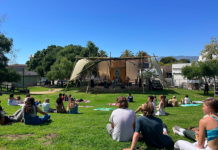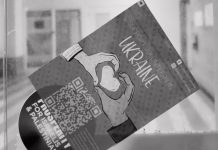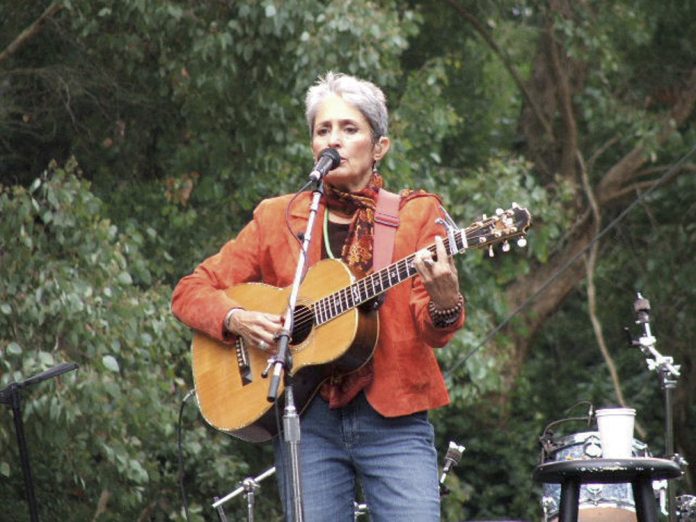Rebecca Lauffenburger
Staff Writer
To simply call folk singer Joan Baez “influential” or even “legendary” is a gross understatement, a fact which I only became acutely aware of as she emerged on stage to greet a receptive and adoring crowd at the Arlington Theater on Nov. 3. Baez nearly incited a riot without even uttering a word.
As she pulled off her jacket to reveal a shirt with big, bold letters reading “Nasty Woman,” a reference to insults slung during the presidential election, the crowd rose to their feet in cheers of support and applause; It appears that even at the ripe age of 75, Joan Baez has not lost her fiercely outspoken spirit or sense of humor.
She dove into her set with the classic “Love is Just a Four-Letter Word” written by Bob Dylan, a long-time collaborator of Baez’s. Her voice, though undeniably weathered with age, was no less powerful or resonant than at the start of her career.
Baez’s setlist encompassed the success of her 58-year long career while also providing fresh material. As Baez strummed the last few chords of her opening tune, she announced, “This tour is a little bit ‘appreciate Bob Dylan month,’” possibly a reference to Dylan’s recent acceptance of the 2016 Nobel Prize in Literature. In addition to Bob Dylan, Baez covered a wide variety of artists including Tom Waits, Paul Simon, and Aretha Franklin.
After a few brief introductory tunes, Baez was joined onstage by her two-part band, jokingly referred to as “The Bad Hombres,” comprised of acclaimed multi-instrumentalist Dirk Powell, as well as her son, Gabe, on drums. Together, the three performed a dynamic rendition of “Silver Dagger,” the type of fierce and dramatic folk epic that has come to epitomize Baez’s style.
Despite her rather remarkable status as a cultural icon, Baez didn’t stand on what would have been a well-deserved pedestal. Instead she exuded a loving and gracious warmth in every interaction with the audience. She spoke candidly, with uninhibited humor and wit, about her extensive experiences not only in musical endeavors but in her personal life as well. She reminisced with the audience about days of the past, when “everybody began experimenting with LSD and [she] was still a virgin.”
Next the audience was transported, in the words of Baez, “back into Dylan Land,” with “It’s All Over Now, Baby Blue,” a song that seemed to mark a shift in the dynamic of the show. Though not as gritty and abrasive as the original, Baez made the old classic her own, inviting the audience to join in with the sweetly subdued chorus.
Next she sang the Woody Guthrie tune “Deportee (Plane Wreck At Los Gatos),” a lyrical epic seeping with newfound relevance and heaviness in the wake of this year’s presidential election, and its implications for immigrants’ futures. She prefaced the song with simple, yet powerful words acknowledging the “beautiful things immigrants bring us, rather than worrying about what they’re going to take from us.”
Joan Baez was never one to shy away from the issues plaguing our times, and even though the period of intense political activism that was the Civil Rights Movement is in the past, Baez has carried on her tradition of social consciousness.
“Prison Trilogy (Billy Rose)” was sung in solidarity with the Innocence Project, which aims to re-open cases of convicted prisoners. “Prison Trilogy” is, as Baez explained, an account of the various stories impressed upon her ex husband during his imprisonment in 1969 for resisting the war draft. The song is an impassioned call to action to “raze the prisons to the ground,” a sentiment still echoing in the wake of today’s prison-industrial complex.
Perhaps the most touching moment of the evening was her performance of “Another World,” a song originally by Anthony and the Johnsons. Baez stood alone on a pitch-black stage under a solitary spotlight and emptied her soul in what was a heart-breaking instance of vulnerability. With a heavy heart she sang “I need another place / Will there be peace / I need another world / This one’s nearly gone.”
Even in the midst of such grave subject matters and displays of raw emotional pain, Baez managed to retain the current of light-hearted humor running through her show by frequently changing lyrics in witty and unexpected ways, and even mocking Dylan’s signature croak in some of her covers.
She sent the crowd away with “Swing Low, Sweet Chariot” which she sang as a lullaby. A quick glance around the nearly sold-out theater revealed a clear skew in the concert’s demographic. Most people in attendance were older, a fact which reveals the devotion of those who looked to her as a voice of their generation, and the enduring gravity and necessity of her message.
Overall, the show served as a rather sobering reminder that despite our tendency to isolate history as something fleeting and far gone, as a society, we still haven’t moved past the need for political activism, or for artists such as Joan Baez, who wrote and sang so profusely about that need.

















